Understanding ABA's Role in Sleep Challenges
Applied Behavior Analysis (ABA) therapy, a scientifically validated approach primarily used to support individuals with autism, extends its benefits beyond traditional behavioral and social skill development. One critical area where ABA is making significant strides is in addressing sleep challenges, a common difficulty for many children on the autism spectrum. This article explores how ABA-based strategies can effectively improve sleep outcomes by using individualized, evidence-based interventions developed and supervised by highly trained behavior analysts.
Foundations of ABA Therapy and Its Application in Autism Support
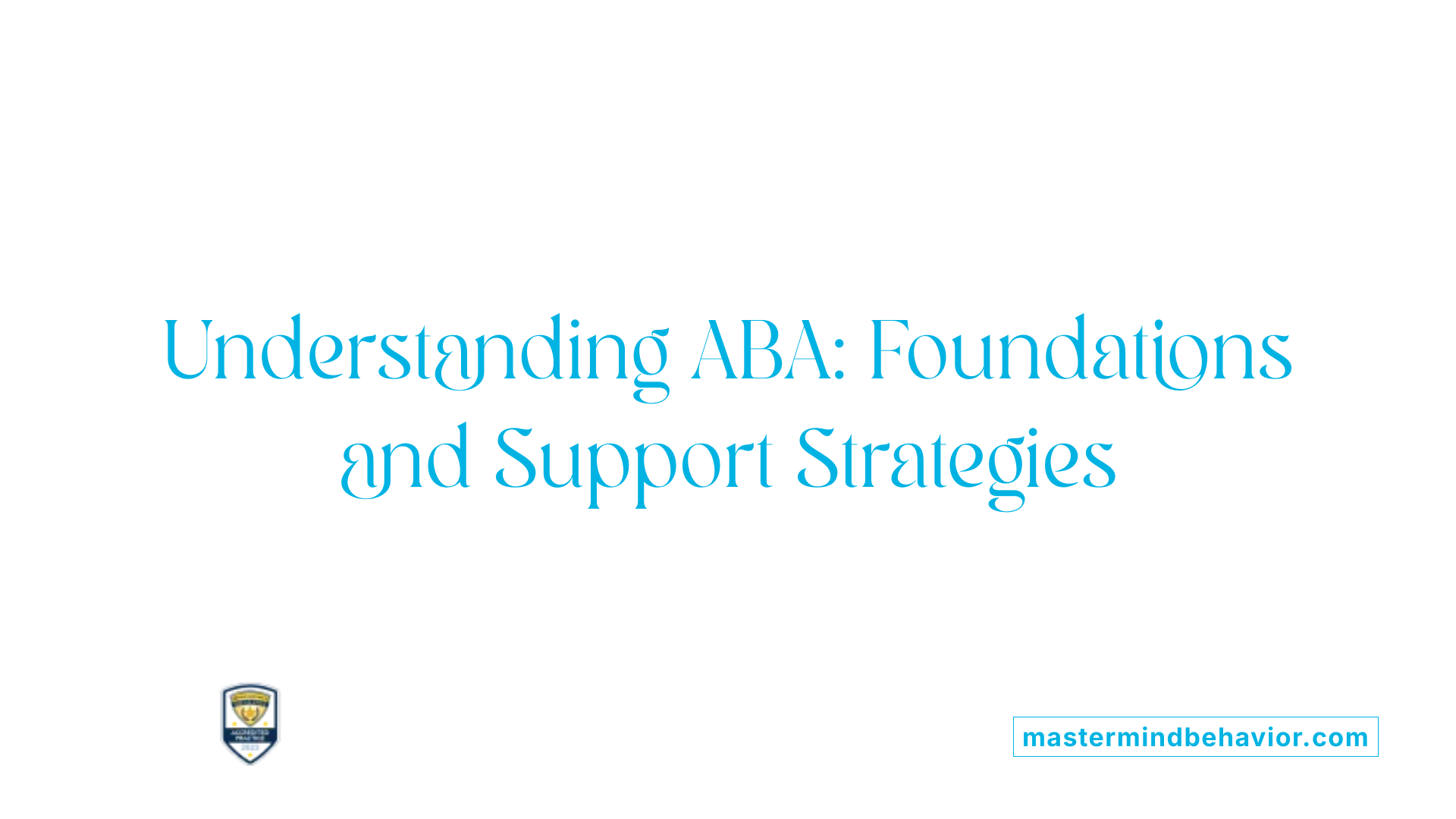
What is applied behavior analysis (ABA) therapy and how is it used to support individuals with autism?
Applied Behavior Analysis (ABA) therapy is a research-based behavioral approach designed to assist individuals with autism and other developmental disorders. ABA applies the principles of learning and behavior science to improve social, communication, cognitive, and adaptive skills. The therapy involves a thorough assessment by Board Certified Behavior Analysts (BCBAs), who develop individualized, person-centered treatment plans tailored to each individual's unique needs.
What are the core principles and methodologies of ABA?
ABA therapy focuses on increasing positive behaviors and decreasing negative behaviors by using techniques such as positive reinforcement and behavior modification while avoiding punishment. Core methodologies include:
- Discrete Trial Training (DTT): Structured one-on-one tasks that emphasize repetition and positive reinforcement.
- Pivotal Response Treatment (PRT): Uses play and child-focused natural reinforcers to engage the learner.
- Early Start Denver Model (ESDM): Combines play-based activities with traditional ABA for multiple simultaneous goals.
These approaches ensure that learning opportunities are embedded within natural settings suited to each child’s developmental stage.
How is ABA applied to address sleep challenges and other needs in autism?
ABA services extend beyond core communication and social skills, addressing diverse challenges such as sleep difficulties, hygiene, eating habits, and behavior management. Programs are delivered across multiple environments—from home and community to specialized centers—to support generalization and practical improvements. For example, Northeast Arc's ABA programs include in-home strategies for children under three, center-based learning, and community group activities, all tailored to help children develop essential life skills.
What role does behavior analysis play in modifying behavior?
Behavior analysis helps identify the functions of behaviors, such as seeking attention or avoiding tasks, to design effective interventions. Tools like functional behavior assessments enable BCBAs to develop Positive Behavior Support (PBS) plans that emphasize safe, meaningful skills development. By understanding environmental triggers and consequences, ABA therapy promotes adaptive behaviors while reducing harmful or disruptive actions, resulting in improved independence and quality of life for individuals with autism.
The Specialized Providers Behind ABA Therapy
Who typically provides ABA therapy for individuals with autism?
ABA therapy is typically administered by Board Certified Behavior Analysts (BCBAs) and licensed behavior analysts. These qualified professionals are specially trained to assess, design, and oversee individualized behavior plans that cater to each child's unique cognitive, social, and behavioral needs.
What training and qualifications do ABA providers have?
Providers must be certified and licensed, evidencing their expertise in evidence-based ABA methods. BCBAs, for instance, undergo rigorous coursework and supervised clinical experience before certification. They are proficient in methodologies like Discrete Trial Training (DTT), Pivotal Response Treatment (PRT), and the Early Start Denver Model (ESDM).
In what settings is ABA delivered?
Services are offered across diverse environments — directly in homes, specialized centers such as Northeast Arc’s Learning Center, and within community settings. This flexibility ensures therapy is contextually relevant and facilitates skill generalization.
How do ABA providers collaborate with multidisciplinary teams and families?
ABA providers work closely with other specialists, including speech and occupational therapists, to address a broad spectrum of developmental goals. Caregivers and families receive behavioral consultation and positive behavior support training, empowering them to support progress and consistency at home and beyond.
This collaborative, multidisciplinary approach ensures that ABA therapy is tailored, effective, and truly person-centered, optimizing outcomes for individuals with autism.
How ABA Therapy Addresses Sleep Challenges in Autism
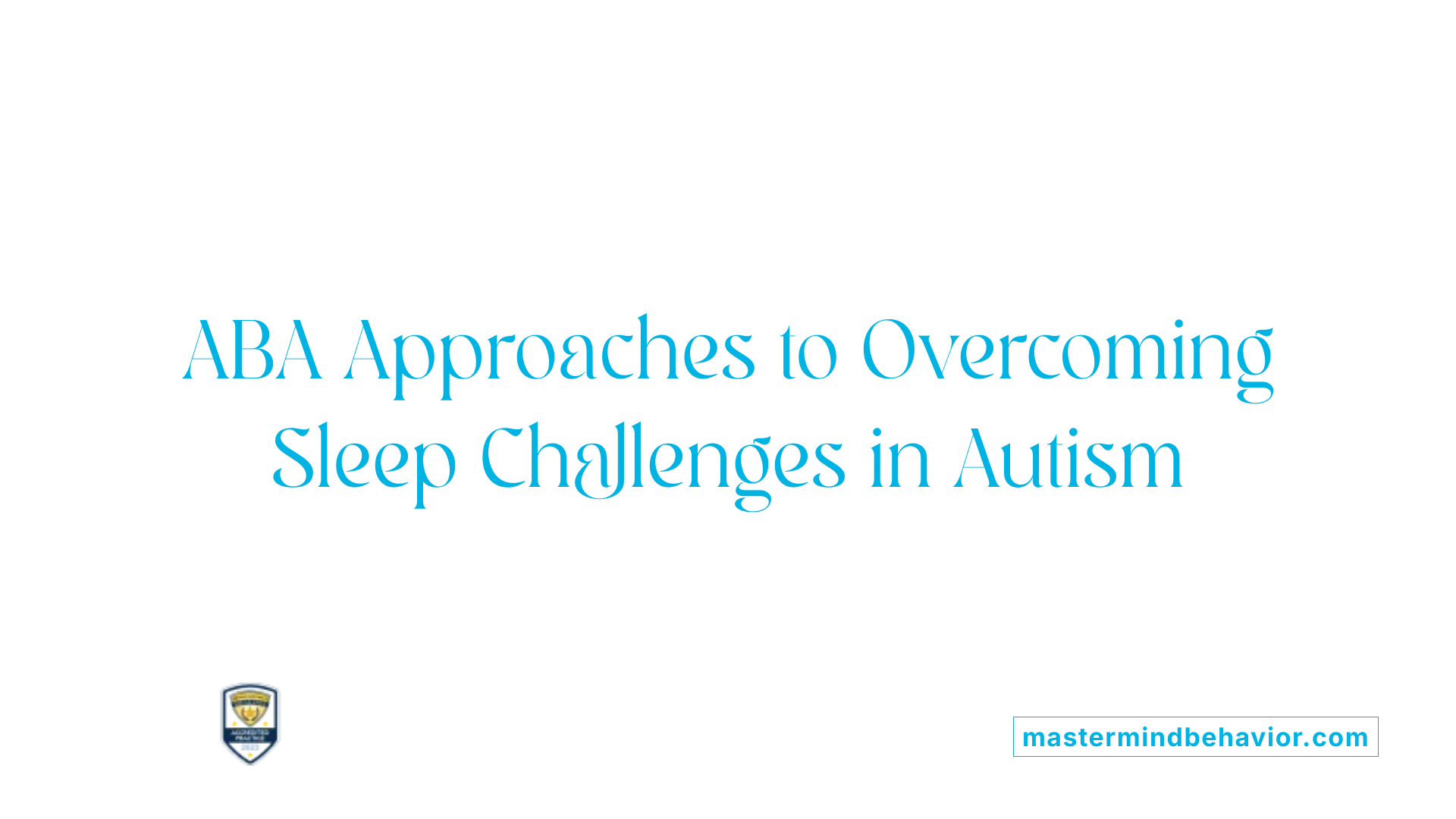
Sleep Difficulties Common in Autism
Many children with autism experience sleep difficulties, which can include trouble falling asleep, frequent night awakenings, and irregular sleep patterns. These issues often affect their cognitive functioning, behavior, and overall quality of life.
Behavioral Assessments Specific to Sleep Issues
Applied Behavior Analysis (ABA) therapy begins with careful assessment by Board Certified Behavior Analysts (BCBAs) who identify underlying behavioral triggers that contribute to sleep problems. These evaluations help determine factors like environmental disruptions, anxiety, or maladaptive routines interfering with rest.
ABA Strategies Tailored for Improving Sleep
ABA interventions for sleep involve teaching positive sleep-related behaviors and reducing behaviors that disrupt rest. Techniques include:
- Positive reinforcement to encourage consistent bedtime routines
- Shaping gradual changes toward desired sleep habits
- Chaining linking steps in a bedtime sequence
- Extinction to reduce behaviors like bedtime resistance
These strategies are applied in natural settings such as the home, combining structured methods like Discrete Trial Training (DTT) with more naturalistic interventions focused on the child's interests.
Importance of Individualized, Person-Centered Plans
Each ABA program is uniquely tailored based on comprehensive assessments, consultation, and the child's specific cognitive and behavioral needs. Person-centered planning ensures interventions are meaningful, respect the child's preferences, and address challenges holistically, including sleep. This thorough individualization supports effective and lasting improvements in sleep behavior.
| Aspect | Description | Example in Sleep Intervention |
|---|---|---|
| Assessment | Identifying behavior triggers for sleep problems | Functional analysis to understand bedtime resistance |
| Positive Reinforcement | Encouraging desirable sleep behaviors | Reward system for staying in bed |
| Structured & Naturalistic | Combining approaches for flexibility | Play-based techniques aligned with routine establishment |
| Individualized Planning | Tailoring interventions for personal needs | Customized bedtime routine promoting calmness |
Designing Individualized Treatment Plans in ABA
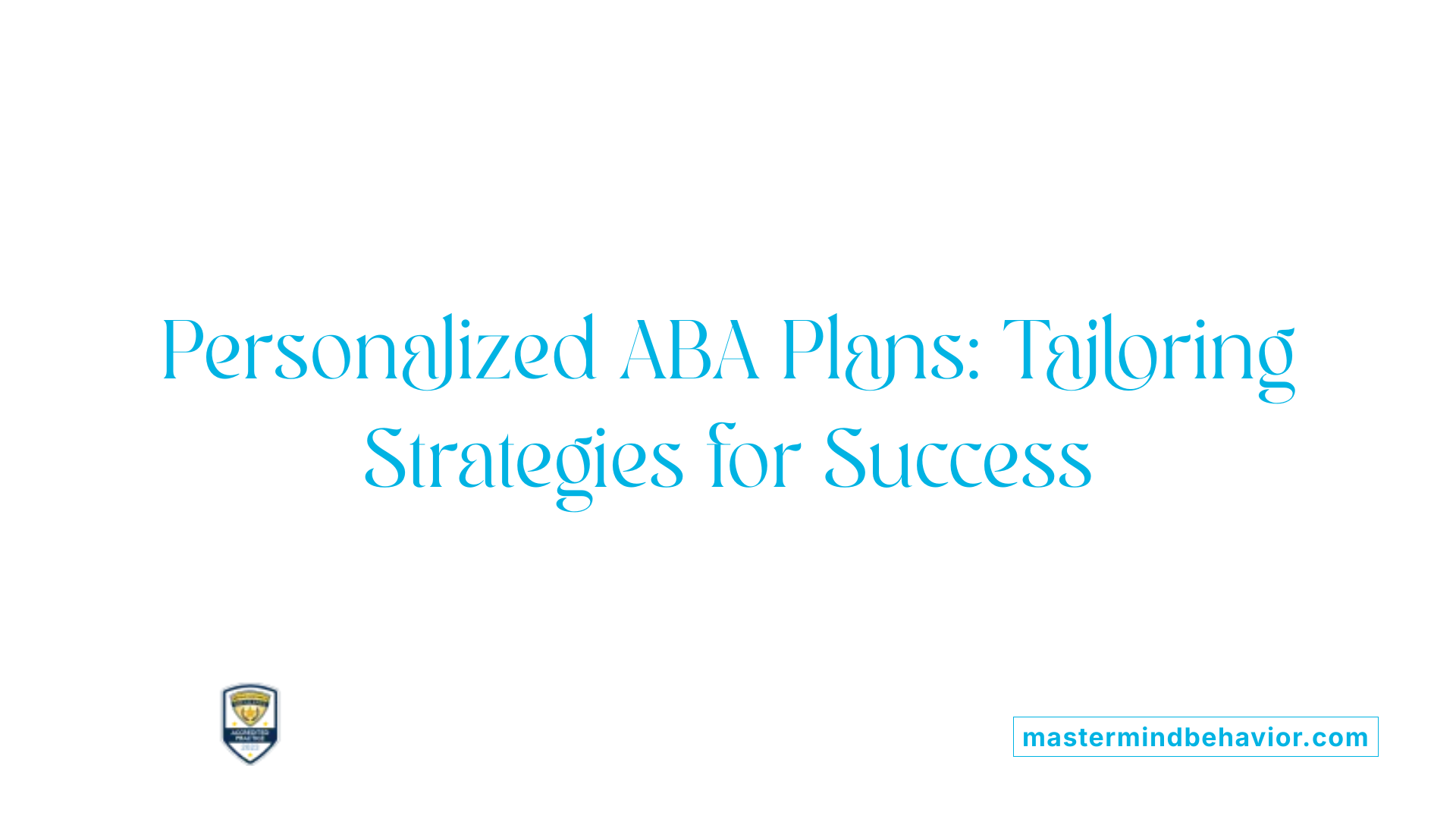
How does ABA therapy tailor treatment plans to individual needs?
ABA therapy begins with comprehensive assessments conducted by Board Certified Behavior Analysts (BCBAs). These include functional behavior assessments (FBA), standardized skill evaluations, and detailed parent or caregiver interviews. The purpose is to identify the child's specific strengths, challenges, and the underlying reasons for particular behaviors.
Assessment processes by BCBAs
BCBAs use these assessments to understand the functions of behaviors—whether they are for escape, attention, access to items, or automatic reinforcement. This understanding allows them to pinpoint environmental triggers and consequences influencing behavior patterns.
Functional behavior assessments
Functional behavior assessments form the backbone of individualized plans by revealing why behaviors occur. This foundational knowledge guides the selection of appropriate interventions and teaching strategies.
Goal setting personalized to strengths and challenges
Based on assessment findings, individualized and measurable goals are established. These goals focus on increasing desirable behaviors and skills while reducing maladaptive behaviors, tailored to each child's unique profile.
Use of ABA methodologies like DTT, PRT, ESDM in interventions
Intervention plans incorporate evidence-based ABA methodologies such as:
- Discrete Trial Training (DTT): Structured one-on-one teaching sessions utilizing positive reinforcement.
- Pivotal Response Treatment (PRT): Child-led play that targets motivation and self-initiated communication.
- Early Start Denver Model (ESDM): A blend of play-based activities with ABA techniques to target multiple developmental areas simultaneously.
These methods are selected and adapted to fit the child’s preferences and developmental level.
Ongoing monitoring and plan adjustments
Data collection occurs during every therapy session to monitor progress closely. This ongoing measurement enables BCBAs to adjust strategies, goals, and intensity based on the child's evolving needs and successes.
Family involvement in treatment
Active collaboration with families is integral. Caregivers receive Positive Behavior Support (PBS) training and consultation to reinforce skills and strategies at home and in the community, promoting generalization and maintenance of progress.
Through this individualized, dynamic process, ABA therapy effectively supports children with autism and other developmental challenges in learning meaningful skills and improving quality of life.
Behavior-Based Behavioral Interventions for Sleep Improvement
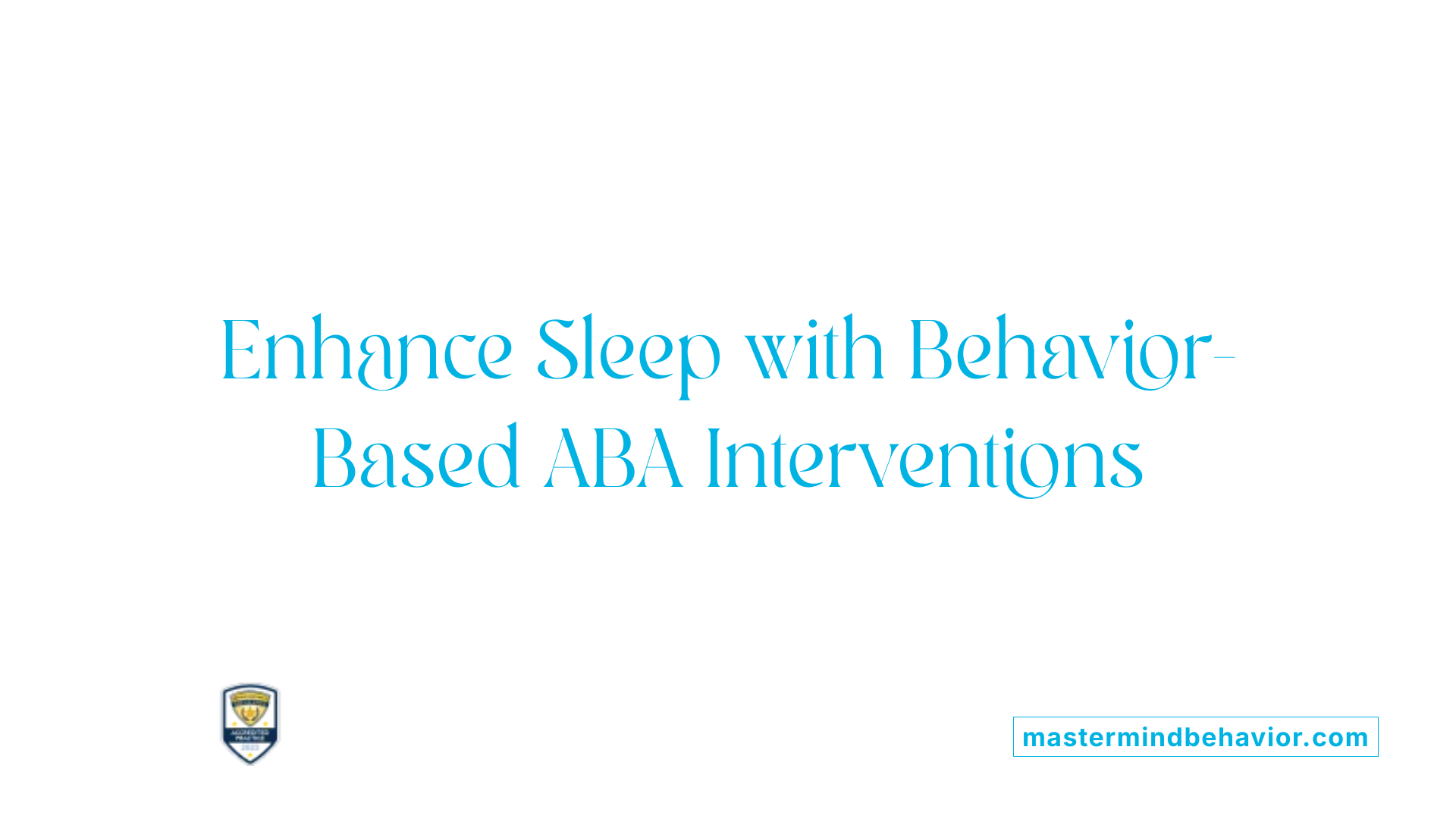
Positive reinforcement and behavior shaping
Applied Behavior Analysis (ABA) uses positive reinforcement to encourage desired sleep behaviors. When a child successfully follows a bedtime routine or stays in bed, praise or a preferred reward reinforces that behavior, gradually shaping better sleep habits. This approach helps increase positive sleep patterns while decreasing disruptive behaviors like nighttime waking or resistance to bedtime.
Use of naturalistic developmental behavioral interventions (NDBI)
Naturalistic Developmental Behavioral Interventions, such as Pivotal Response Treatment (PRT) and Early Start Denver Model (ESDM), integrate ABA principles with developmental psychology. These interventions focus on using play and natural settings to create learning opportunities, making sleep-related behavior changes feel more natural and engaging for the child. NDBI strategies involve caregivers directly, ensuring consistency and generalization of sleep skills across environments.
Techniques like prompting, modeling, and chaining applied to sleep routines
Techniques central to ABA like prompting, modeling, and chaining are applied to improve sleep routines. Prompts gently guide the child through bedtime steps, modeling demonstrates correct behaviors like brushing teeth or settling into bed, and chaining breaks down the entire process into manageable steps taught sequentially. This structured approach builds independence while reinforcing habitual sleep behaviors.
Addressing environmental factors influencing sleep behaviors
Behavioral interventions also consider environmental triggers affecting sleep, such as noise, lighting, or room setup. ABA assessments identify these factors, allowing tailored modifications that reduce disruptions and promote relaxation. Adjusting environmental variables enhances the effectiveness of intervention plans aimed at helping children develop consistent, restful sleep patterns.
Benefits of ABA Therapy in Enhancing Sleep and Overall Development
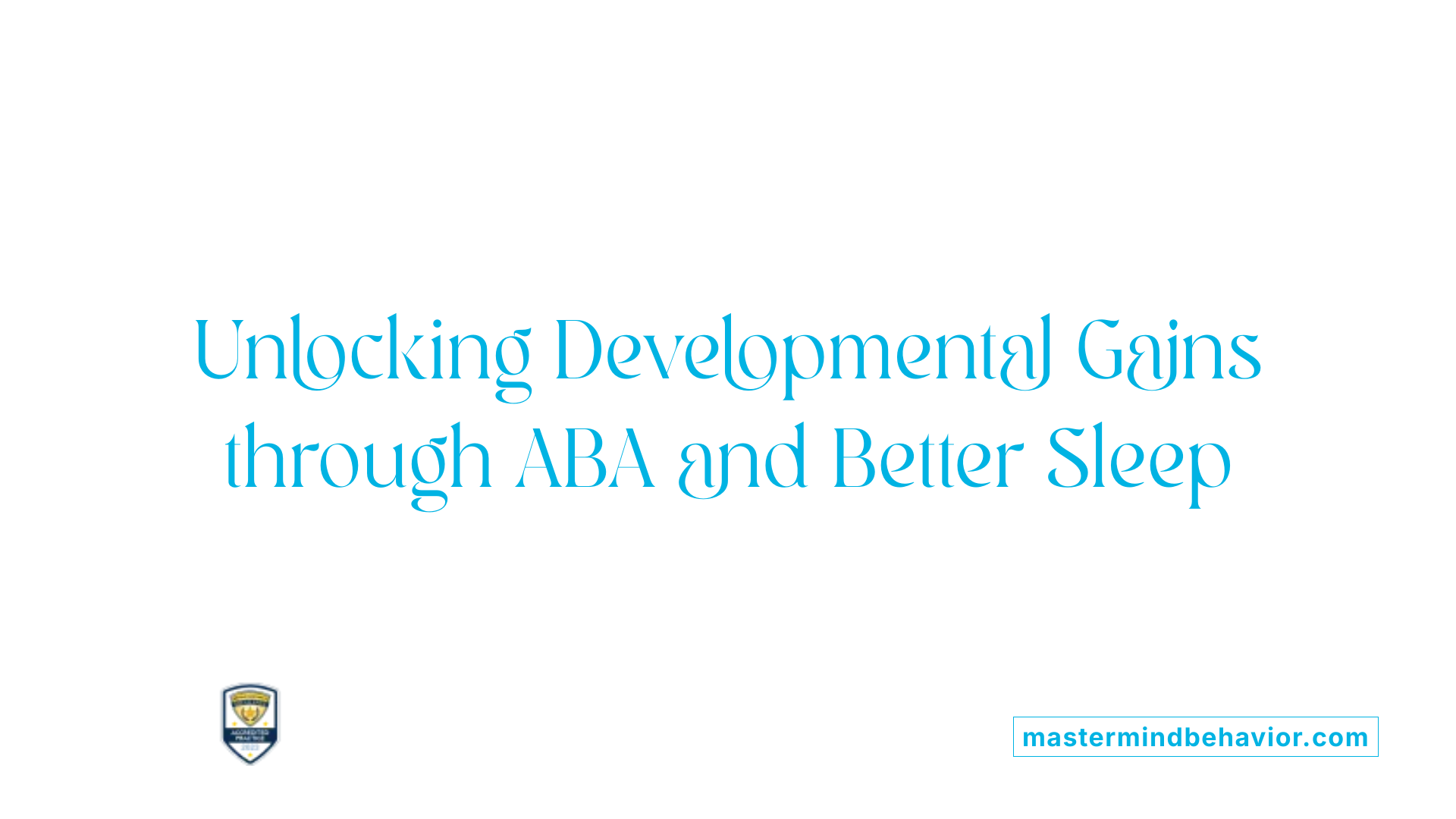
How Does ABA Therapy Improve Sleep and Daytime Functioning?
ABA therapy addresses behavioral challenges that often interfere with sleep in children with autism, such as anxiety, sensory sensitivities, or difficulty following routines. By implementing individualized plans targeting these behaviors, children experience improved sleep patterns that lead to more restful nights. Better sleep subsequently enhances daytime functioning, including increased attention, mood stability, and energy levels, which support learning and social engagement.
What Is the Link Between Sleep Improvements and Gains in Social and Language Skills?
Quality sleep supports brain development and cognitive processes vital to social and communication skills. ABA interventions promoting healthy sleep help children better consolidate learning acquired during therapy sessions. Studies show that children receiving early intensive ABA display notable improvements in expressive language and social interactions, highlighting how improved sleep and daytime cognitive function reinforce each other for skill development.
How Does Early Intensive ABA Foster Developmental Progress?
Starting ABA therapy early—ideally before age four—with intensive hours (over 20 per week) yields large developmental gains across multiple domains. This early intervention helps children acquire critical social, communication, and adaptive behaviors sooner, reducing the need for specialized services later. Early, consistent therapy also supports foundational skills such as motor development and emotional regulation, which foster overall progress.
How Does Improving Sleep and Behavior Enhance Quality of Life?
By reducing sleep disruptions and addressing challenging behaviors, ABA therapy empowers children to participate more fully in daily routines and social settings. Improvements in behavior and sleep promote independence, better mood, and decreased stress for both children and caregivers. These positive changes contribute significantly to a higher quality of life and more meaningful community integration.
| Benefit Aspect | Description | Underlying ABA Approach |
|---|---|---|
| Sleep Quality | Reduction of sleep-interfering behaviors and anxieties | Individual assessment and behavior strategies |
| Daytime Functioning | Enhanced attention, mood, and learning capacity | Positive reinforcement and routine establishment |
| Social and Language Development | Improved communication, social skills due to better rest | Early intensive and naturalistic ABA interventions |
| Overall Quality of Life | Greater independence and family well-being | Personalized goals and caregiver training |
Addressing Ethical Concerns and Challenges in ABA Therapy
What are some challenges or criticisms associated with ABA therapy?
ABA therapy has faced several criticisms, particularly related to its historical intensity and the use of harsh punishment practices. Past methods sometimes prioritized compliance over individual comfort, which could lead to distress and emotional harm for the child.
Historical criticisms and safety considerations
Originally, some ABA programs emphasized strict routines and punishment, which raised ethical concerns about psychological injury and suppression of behaviors that are natural to autistic individuals. There is justified worry that focusing solely on reducing “undesired” autistic behaviors may promote masking, causing emotional exhaustion or trauma.
Avoiding harsh punishment and promoting positive reinforcement
Modern ABA rejects punitive measures, instead emphasizing positive reinforcement to encourage desired behaviors. Techniques like Discrete Trial Training (DTT) now focus on rewarding progress and no longer employ punishment, ensuring a safer and more supportive environment for learning.
Balancing structure with respect for neurodiversity
Effective ABA programs are individualized and respect each child's unique strengths and preferences. By tailoring goals and methods, therapists avoid a one-size-fits-all approach. This balance helps maintain structure while honoring neurodiversity and personal autonomy.
Ensuring child comfort and engagement
Therapy should prioritize the child’s comfort and interest. Approaches such as Pivotal Response Treatment (PRT) and Early Start Denver Model (ESDM) use play and naturalistic reinforcement, making learning enjoyable and less stressful. Lack of engagement or distress signals the need for reassessment.
Monitoring and revising therapy as needed
Ongoing monitoring by caregivers and professionals is crucial. Participating actively and voicing concerns ensures progress and safety. If therapy causes harm, excessive time commitment, or no progress within reasonable timeframes, reconsidering or revising the approach is essential.
Through ethical implementation that centers on positive reinforcement, respect, and individualized care, ABA therapy can effectively support skill development and behavioral improvements while minimizing harm.
Supporting Caregivers and Promoting Lasting Change Beyond Therapy
Training caregivers in Positive Behavior Support (PBS)
Northeast Arc emphasizes empowering caregivers through Positive Behavior Support (PBS) training. PBS equips caregivers and professionals with practical strategies to understand behaviors and promote positive changes without relying on punishment. This training ensures caregivers can consistently apply effective interventions, fostering supportive environments for individuals with autism.
Role of ongoing behavioral consultation
Ongoing behavioral consultation is critical for maintaining and adapting intervention plans. Board Certified Behavior Analysts (BCBAs) provide continuous guidance, helping caregivers and therapists adjust strategies based on observed progress or new challenges. This dynamic support improves consistency, problem-solving, and better addresses evolving needs.
Strategies to generalize sleep and other behavioral skills
ABA programs at Northeast Arc focus on generalizing critical skills such as sleep hygiene, communication, and social behaviors across home, community, and center settings. Techniques include naturalistic teaching, caregiver involvement, and reinforcement systems designed to help individuals transfer newly learned skills beyond therapy sessions into everyday routines.
Importance of family involvement and community settings
Family involvement is essential in reinforcing and sustaining behavioral improvements. Caregivers learn to replicate therapeutic strategies in natural contexts, promoting independence and confidence. Furthermore, delivering ABA services in community settings offers real-world learning opportunities, aiding skill generalization and social inclusion. Community group activities and summer programs actively support social and adaptive growth outside clinical environments.
Future Perspectives on ABA for Sleep in Autism
ABA therapy continues to evolve as a powerful tool not only for core autism challenges but also for improving essential behaviors such as sleep. By integrating evidence-based, individualized behavior strategies delivered by certified professionals and supported by families, ABA holds promise for enhancing sleep quality and thus overall developmental progress for children on the spectrum. Ethical, respectful implementation and active caregiver involvement remain paramount to maximize benefits while honoring each individual's needs and dignity. As research advances, the refinement of sleep-specific ABA interventions will help further illuminate best practices, empowering more families to address sleep challenges effectively and improve quality of life for their loved ones.








